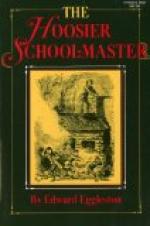[Footnote 8: This prefixed y is a mark of a very illiterate or antique form of the dialect. I have known piece yarthen used for “a piece of earthen” [ware], the preposition getting lost in the sound of the y. I leave it to etymologists to determine its relation to that ancient prefix that differentiates earn in one sense from yearn. But the article before a vowel may account for it if we consider it a corruption. “The earth” pronounced in a drawling way will produce the yearth. In the New York Documents is a letter from one Barnard Hodges, a settler in Delaware in the days of Governor Andros, whose spelling indicates a free use of the parasitic y. He writes “yunless,” “yeunder” (under), “yunderstanding,” “yeundertake,” and “yeouffeis” (office).]
[Footnote 9: Like many of the ear-marks of this dialect, the verb “dog-on” came from Scotland, presumably by the way of the north of Ireland. A correspondent of The Nation calls attention to the use of “dagon” as Scotch dialect in Barrie’s “Little Minister,” a recent book. On examining that story, I find that the word has precisely the sense of our Hoosier “dog-on,” which is to be pronounced broadly as a Hoosier pronounces dog—“daug-on.” If Mr. Barrie gives his a the broad sound, his “dagon” is nearly identical with “dog-on.” Here are some detached sentences from “The Little Minister:”
“Beattie spoke for more than himself when he said: ’Dagon that Manse! I never gie a swear but there it is glowering at me.’”
“‘Dagon religion,’ Rob retorted fiercely; ‘t spoils a’ thing.’”
“There was some angry muttering from the crowd, and young Charles Yuill exclaimed, ’Dagon you, would you lord it ower us on week-days as well as on Sabbaths?’”
“‘Have you on your Sabbath shoon or have you no on your Sabbath shoon?’ ‘Guid care you took I should ha’e the dagont things on!’ retorted the farmer.”
It will be seen that “dagont,” as used above, is the Scotch form of “dog-oned.” But Mr. Barrie uses the same form apparently for “dog-on it” in the following passage:
“Ay, there was Ruth when she was na wanted, but Ezra, dagont, it looked as if Ezra had jumped clean out o’ the Bible!”
Strangely enough, this word as a verb is not to be found in Jamieson’s dictionary of the Scottish dialect, but Jamieson gives “dugon” as a noun. It is given in the supplement to Jamieson, however, as “dogon,” but still as a noun, with an ancient plural dogonis. It is explained as “a term of contempt.” The example cited by Jamieson is Hogg’s “Winter Tales,” I. 292, and is as follows:
“What wad my father say if I were to marry a man that loot himsel’ be thrashed by Tommy Potts, a great supple wi’ a back nae stiffer than a willy brand? . . . When one comes to close quarters wi’ him he’s but a dugon.”




